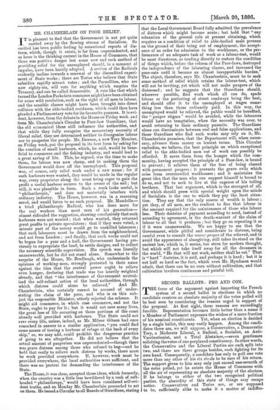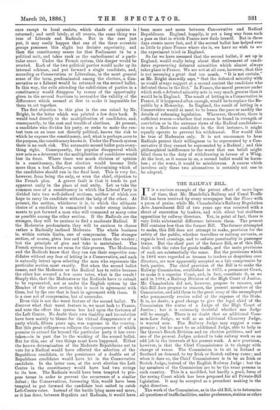SECOND BALLOTS : PRO AND CON. T HE force of the
argument against importing the French system of a second ballot in elections in which no candidate receives an absolute majority of the votes polled will be best seen by considering the reasons urged in support of the proposal. At first sight, these reasons are exceedingly forcible. Representation becomes little better than a name if a Member of Parliament expresses the wishes of a mere fraction of his nominal constituents. Yet, when an election is decided by a single ballot, this may easily happen. Among the candi- dates there are, we will suppose, a Conservative, a Democratic Tory, a Moderate Liberal, a Radical, a Socialist, an Anti- Vaccinationist, and a Total Abstainer,—seven gentlemen soliciting the votes of one perplexed constituency. In other words, the Conservative and the Liberal Parties are each split into two, and there are three groups besides, each fighting for its own hand. Consequently, a candidate has only to poll one vote more than any other of his six rivals to be sure of his return. The support given to him may only just exceed one-seventh of the votes polled, yet he enters the House of Commons with all the air of representing an absolute majority of the electors. If he belongs to either of the two recognised political parties, the absurdity of this state of things may escape notice.: Conservatives and Tories are, or are supposed to be, sufficiently alike to make it a matter of indiffer-
ence except to local zealots, which shade of opinion is returned ; and until lately, at all events, the same thing was true of Liberals and Radicals. But in the case just put, it may easily happen that one of the three eccentric groups possesses this slight but decisive superiority, and then the constituency ceases for that Parliament to be a political unit, and takes rank as the embodiment of a parti- cular craze. Under the French system, this danger would be averted. Each of the two political parties would make up its internal schisms, and put forward a single candidate, and, according as Conservatism or Liberalism, in the most general sense of the term, predominated among the electors, a Con- servative or a Liberal would be returned on the second ballot. In this way, the evils attending the subdivision of parties in a constituency would disappear by reason of the opportunity given to the several fractions to reconsider the validity of the differences which seemed at first to make it impossible for them to act together.
The first objection to this plan is the one raised by Mr. Bright, in the letter which was printed a few days back. It would tend directly to the multiplication of candidates, and, consequently, to the coat and trouble of elections. At present, a candidate who divides his party, or seeks to make the con- test turn on an issue not directly political, knows the risk to which he exposes the constituency, and, what is perhaps more to thepurpose, the constituency knows it. Under the French system there is no such risk. The automatic second ballot puts every- thing right. Consequently, the popular disapproval which now acts as a deterrent to the multiplication of candidates would lose its force. Where there was much division of opinion in a constituency, the first election would become little more than a test ballot,—a means of determining which of the candidates should run in the final heat. This is very far, however, from being the only, or even the chief, objection to the French plan. A graver fault is that it tends to put apparent unity in the place of real unity. Let us take the common case of a constituency in which the Liberal Party is divided into two well-defined sections, neither of which can hope to carry its candidate without the help of the other. At present, the section, whichever it is, to which the ultimate choice of a candidate is committed is under strong induce- ments to put forward a man who will command as many votes as possible among the other section. If the Radicals are the stronger, they will be anxious to find a moderate Radical. If the Moderates predominate, they will be anxious to choose rather a Radically inclined Moderate. The whole business is, within certain limits, one of compromise. The stronger section, of course, gives less and takes more than the weaker ; but the principle of give and take is maintained. The French system leaves no room for this process. The Moderates and the Radicals know that they can run their respective can- didates without any fear of letting in a Conservative, and each is naturally intent upon selecting the man who represents the particular section most exactly. But when the second ballot comes, and the Moderate or the Radical has to retire because the other has secured a few more votes, what is the result ? Simply this, that the Moderates or the Radicals have to submit to be represented, not as under the English system by the Member of the other section who is most in agreement with them, but by the one that is least in agreement with them. It is a case not of compromise, but of surrender.
Even this is not tha worst feature of the second ballot. To discover what that worst feature is, we must look to France, and note the effect the system has had upon the fortunes of the Left Centre. No doubt their own timidity and irresolution have been mainly to blame for the virtual disappearance of a party which, fifteen years ago, was supreme in the country. But this great collapse—a collapse the consequences of which promise to extend far beyond the particular party it has over- taken—is in part due to the working of the second ballot. But for this, one of two things must have happened. Either the known determination of the Moderate Republicans not to vote for a Radical would have affected the selection of the Republican candidate, or the persistence of a double set of Republican candidates would have let in the Conservative candidate. In the latter case, at the next election the Left Centre in the constituency would have had two strings to its bow. The Radicals would have been tempted to pro- pose terms in order to prevent the recurrence of a similar defeat ; the Conservatives, foreseeing this, would have been tempted to put forward the candidate best suited to catch Left-Centre votes. Instead of the battle lying more and more, as it has done, between Royalists and Radicals, it would have been more and more between Conservative and Radical Republicans. England, happily, is yet a long way from such a pass as that in which France now finds herself. But in these days events move fast, and if the second ballot has helped ever so little to place France where she is, we have no wish to see the experiment tried in England.
So far we have assumed that the second ballot, if set up in England, would really bring about that retirement of candi- dates representing defeated minorities which almost always takes place in France. We are not at all sure, however, that this is not assuming a great deal too much. " It is not certain," as Mr. Bright shrewdly says," that the defeated minority with us would always support at a second contest the candidate who defeated them in the first." In France, the moral pressure under which such a defeated minority acts is very much greater than it would be in England. The result of letting in a Conservative in France, if it happened often enough, would be to replace the Re- public by a Monarchy. In England, the result of letting in a Conservative would at most be to lessen the pace or modify the details of reforming legislation. Wherever, therefore, there is sufficient reason—whether that reason be found in strength of conviction or in the extreme views of the Radical candidate— to run a Moderate candidate in the first instance, it might equally operate to prevent his withdrawal. Nor would this be true of Moderates only. It is not uncommon to hear Radicals protest. their willingness to be represented by a Con- servative if they cannot be represented by a Radical ; and this philosophical indifference to the worst that can befall might blind them to the duty of withdrawing in favour of a Whig. At the best, as it seems to us, a second ballot would be harm- less ; at the worst, it would be mischievous. A course which involves only these two alternatives is certainly not one to be adopted.



































 Previous page
Previous page